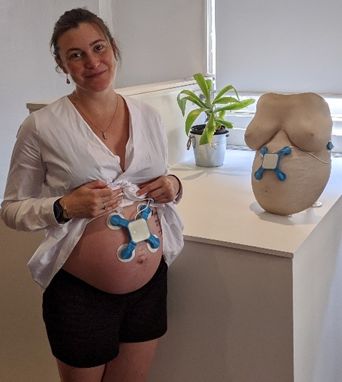It's no secret that 2020 was a year like no other. To mark International Women's Day 2021, DCC caught up with some of the impressive women in its network of Women in STEM, to ask them about the past 12 months, and the lessons and insights they have gained in the face of the challenges of the Covid-19 pandemic. Across this month, we will be sharing some of their responses with you.

"The pandemic has impacted a number of areas globally, one of which that has really suffered is women's health and pregnancy. It is hard not to be personally affected by these things when you know what you are working on can make a difference." – Dr Sarah McDonald, Baymatob"
Dr Sarah McDonald of Baymatob" is the inventor of the Oli" medical device for non-invasive monitoring of pregnancy and labour. Sarah's photograph shows her wearing the Oli" device whilst she was pregnant with her third child in 2020. Sarah was one of the speakers at DCC's panel discussion on Gender Equality in STEM, held at DCC's Sydney office in May 2018. Her thoughtful responses to our questions are set out below.
- How has the last year changed your perspectives on your work?
I am not sure I would say the last year has changed my perspective on my work, more it has further cemented the importance of what we are doing at Baymatob. The pandemic has impacted a number of areas globally, one of which that has really suffered is women's health and pregnancy. It is hard not to be personally affected by these things when you know what you are working on can make a difference.
- What lessons from the pandemic do you plan to take into the future (post-pandemic world)?
The biggest lesson from the pandemic is that the only certainty in life is that we are all human. Positions, roles, material items and life as we know it can all be uprooted and change overnight but we will all remain human. By recognising this I hope we can better understand and relate to everyone irrespective of variations in values, motives, needs and wants in the post pandemic world.
- How has your business evolved over the last year? Do you imagine it will stay that way?
Like many we had to find ways of managing the business and progress in our projects going in a way that presented minimal disruption from lockdowns and remote working. With this we adopted a number of tools to best ensure we could still collaborate and meet virtually, we developed policies that enabled technical and trial work to continue, and we found creative ways to ensure the team still felt connected throughout the disruption. I do believe it will stay that way as it has proved useful beyond the pandemic, for example it has helped team members with family living remotely to be able to see their family and continue work, it has also enabled team members with children to manage work with family life. I also think another area it has helped is everyone is more conscious of their health, staying home when ill and encouraging others to take care – I really hope this continues as I believe it represents a healthy shift away from where society was before.
- Have you found existing ties/relationships have withstood the changes to communication and the availability of face-to-face interactions?
I would say many have withstood the changes in communication. I think if anything the fact we all have faced this together some way or another has meant many ties were brought closer than they would have otherwise been. As I said earlier we are all human.
The content of this article is intended to provide a general guide to the subject matter. Specialist advice should be sought about your specific circumstances.

